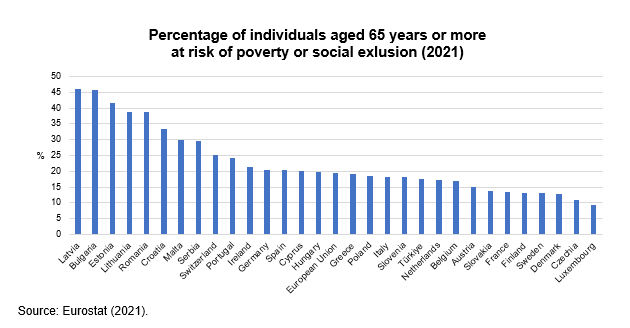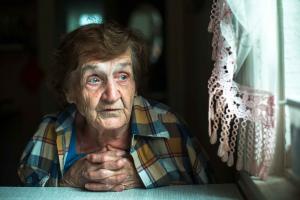At any age, intersecting factors such as poverty, disability, social isolation, and exposure to abuse can increase the risk of vulnerability and weaken resilience in the case of adverse events. The COVID-19 pandemic, rising inflation, natural disasters, and war are examples of adverse events that have disproportionately affected vulnerable persons, including many older persons. Often, the capacities and vulnerabilities of older persons remain invisible as their voices are less heard and their needs less known due to a lack of data and research, and their insufficient involvement in decision-making. A key challenge, therefore, is to inform, design and implement comprehensive policies that protect vulnerable older persons from adverse outcomes, enhance resilience and allow them to fulfil their full potential in later life.

Key Recommendations for Action
Based on policy practice shared by members of the UNECE Standing Working Group on Ageing (SWGA), UNECE’s latest Policy Brief on Ageing provides a comprehensive set of recommendations to guide policymakers. It emphasizes the importance of adopting a human rights-based approach to address the needs of older persons, calling for an inclusive society that respects their autonomy, dignity, and participation in decision-making processes. The key areas of focus are:
1. Ensuring adequate incomes and access to affordable housing
Factors such as low pensions or savings, and difficulties finding suitable employment are main causes of vulnerability among older individuals. While the current costs-of-living crisis presents an additional challenge for many older individuals in making their ends meet there are a number of ways to ensure adequate incomes for vulnerable older individuals. For instance, to support older jobseekers and reduce unemployment, the Employment Agency of Luxembourg (ADEM) provides financial incentives to employers who hire eligible candidates by covering their share of the social security contributions. Furthermore, many countries in the UNECE region, including Denmark, Finland, Germany, Portugal and Slovakia, have acted to financially support disadvantaged older individuals during the costs-of-living crisis through energy price caps and one-off payments. In Slovakia, for instance, older persons aged 62 and above without an income from retirement benefits, business or other sources were able to apply for a one-time contribution of €100 in 2022 to reduce the burden of inflation.
2. Providing health, long-term care, and community services
Whereas the vulnerability of individuals to physiological and psychological health risks increases with age, especially for older women, access and quality of healthcare and long-term care services are often limited, creating significant vulnerabilities for older individuals. Developing integrated person-centred care services as well as the expansion of home, day, and end-of-life care services is crucial to confront this challenge. The Brief highlights several policy examples that aim to provide affordable, accessible, and quality health and long-term care services countries. They include the “Havenue” pilot project in Rotterdam, the Netherlands, which aimed at enabling frail older individuals to stay at home as long as possible by providing an integrated care concept, coordinated between general practitioners, (informal and formal) caregivers and welfare professionals. Another example is Azerbaijan, which has been expanding the availability of day-care centers in several regions, providing care, a safe environment and an opportunity to socialize and enjoy activities in a group setting to vulnerable older individuals.
3. Prevention of violence, abuse and neglect
Preventing harm and abuse against older persons in vulnerable situations is critical to protect their human rights. Many countries in the UNECE region have taken measures to raise awareness and improve legislation and procedures to protect victims of abuse or violence. For instance, Ireland has developed National Standards for Adult Safeguarding to promote a consistent approach to preventing and responding to harm, offering a common language to describe adult safeguarding in health and social care services and comprehensive training tools for front-line staff to take a human rights-based approach to care. Persons fleeing from war and especially women, are particularly vulnerable to abuse and violence. HelpAge International, supported by the United Nations Populations Fund (UNFPA), has established Safe Spaces for youth, women, and older refugees seeking temporary shelter and protection in the Republic of Moldova. Among other services, older people can receive gender based-violence prevention and protection services, including psychological counselling, referral services and information.
4. Reducing loneliness and encouraging social participation
Loneliness and social isolation are widespread issues among older persons in the UNECE region, particularly among older women who are more likely to live alone. Governments and community organizations have taken steps to address this issue through programs and initiatives aimed at increasing social connectedness, such as social clubs, community centers, and intergenerational activities. Programmes that provide opportunities for older persons to participate in social activities and access community services have been implemented in many countries, including Austria, Belgium, Canada, and Kazakhstan. Specific initiatives include exercise and training programs for vulnerable older people, sponsorship programs for older refugees, and walking groups. For instance, Italy’s region of Lombardy has implemented a walking groups program that brings together young and older individuals, aimed particularly at persons which show both health and social isolation risk factors. The walks are guided by a professional guide who identifies the route, organizes the schedule, welcomes participants and supervises the group walk
Implementation and Collaboration
To address the challenges faced by older persons, it is important to take a multi-faceted approach that involves both short-term and long-term strategies. In the short-term, there is need for measures that provide immediate relief to older persons in vulnerable situations. In the long-term, taking a comprehensive approach to address the challenges faced by older persons will likely be most successful.
The Policy Brief stresses that older persons need to be involved in the design and implementation of policies to ensure that they meet their specific needs and preferences. It also highlights the crucial role of having timely and relevant (age-disaggregated) data available for designing effective policy strategies supporting older persons in vulnerable situations.
Read more
UNECE Policy Brief on Ageing No. 28 "Older Persons in Vulnerable Situations": https://unece.org/policy-briefs
UNECE Standing Working Group on Ageing (SWGA), https://unece.org/population/standing-working-group-ageing
Eurostat, “Persons at risk of poverty or social exclusion by age and sex”, https://ec.europa.eu/eurostat/databrowser/view/ILC_PEPS01N/default/table?lang=en


